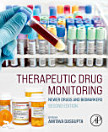Clinical Challenges in Therapeutic Drug Monitoring: Special Populations, Physiological Conditions and Pharmacogenomics
About this ebook
Ratings and reviews
About the author
William Clarke received his PhD in Analytical Chemistry from the University of Nebraska in Lincoln in 2000, followed by a post-doctoral fellowship in Clinical Chemistry at the Johns Hopkins School of Medicine, ending in 2002. In addition, he received an MBA focused on Medical Services Management from the Carey School of Business at Johns Hopkins in 2007. He is an Associate Professor in the Department of Pathology, as well as the director of both Point-of-Care Testing and Clinical Toxicology for The Johns Hopkins Hospital. Dr. Clarke is board certified in Clinical Chemistry by the American Board of Clinical Chemistry, and is a Fellow of the National Academy of Clinical Biochemistry. Dr. Clarke has published, as author or co-author, over 100 peer-reviewed manuscripts and book chapters. He is the Editor of the book Contemporary Practice in Clinical Chemistry, and the Co-Editor-in-Chief for the journal Practical Laboratory Medicine.
Amitava Dasgupta received his Ph. D in chemistry from Stanford University and completed his fellowship training in Clinical Chemistry from the Department of Laboratory Medicine at the University of Washington School of Medicine at Seattle. He is board certified in both Toxicology and Clinical Chemistry by the American Board of Clinical Chemistry. Currently, he is a tenured Full Professor of Pathology and Laboratory Medicine at the University of Kansas Medical Center and Director of Clinical Laboratories at the University of Kansas Hospital. Prior to this appointment he was a tenured Professor of Pathology and Laboratory Medicine at the University of Texas McGovern medical School from February 1998 to April 2022. He has 252 papers to his credit. He is in the editorial board of four journals including Therapeutic Drug Monitoring, Clinica Chimica Acta, Archives of Pathology and Laboratory Medicine, and Journal of Clinical Laboratory Analysis.







